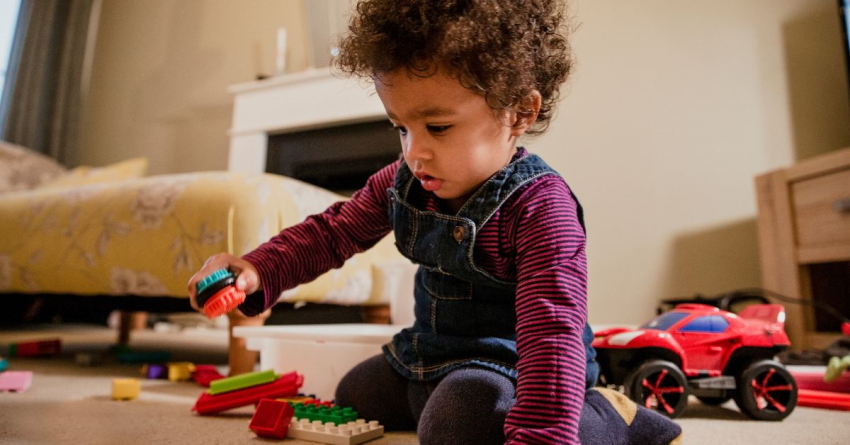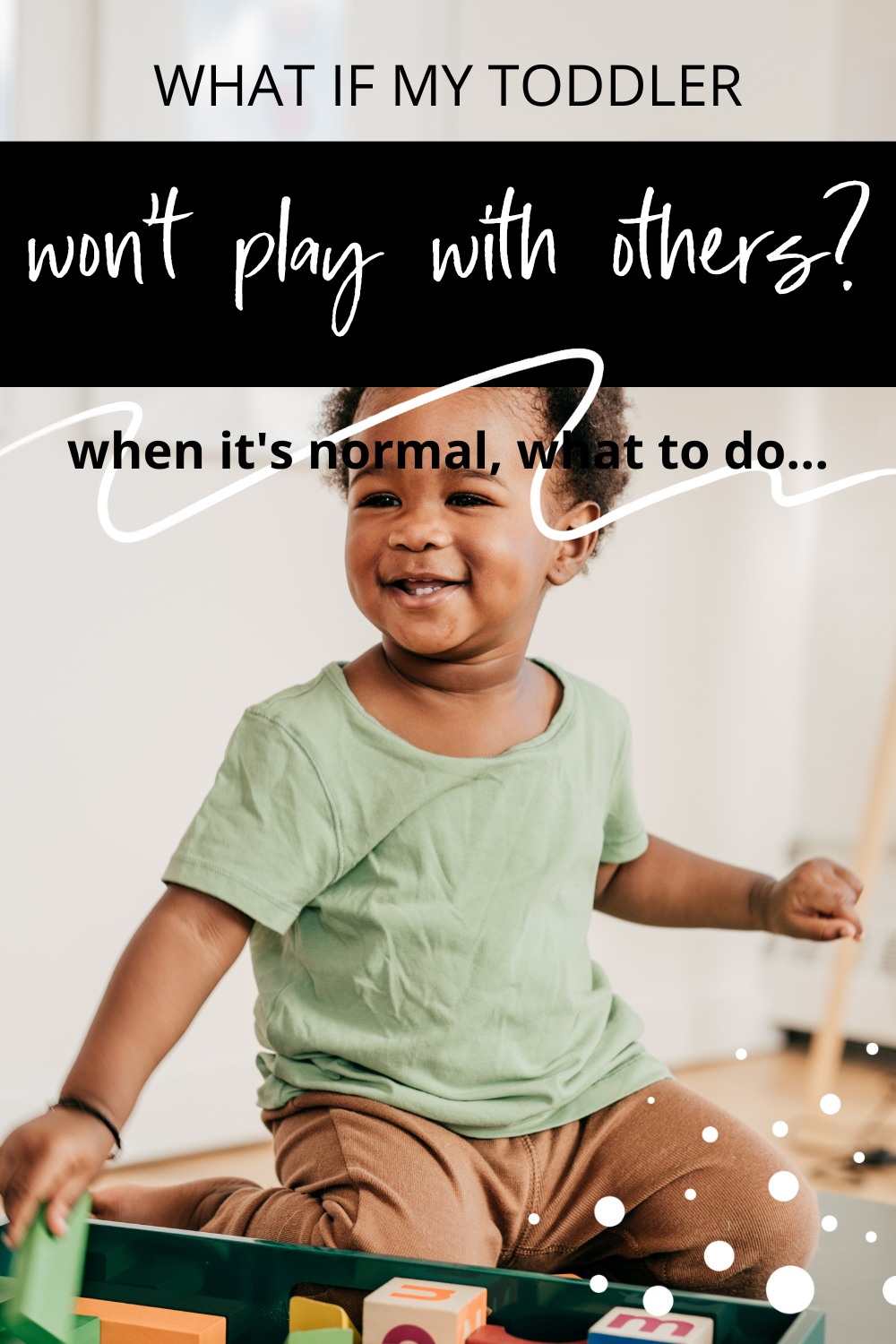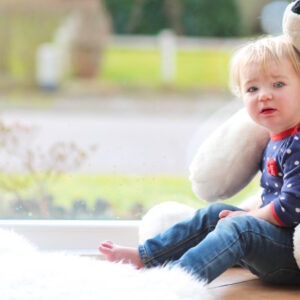It’s time for a play date, and Mom finally gets some rest… or not. Suddenly, your little sunshine is grumpy, crying, and clinging to your legs.
What if a toddler won’t play with other children? Apart from being disappointing when all you wanted was to sip a coffee for 10 minutes while the kids were playing, is this really normal?
Read our Q&A with a concerned mom.

Mom’s Question:
Hi,
I have a 20-month-old daughter who is absolutely gorgeous and wonderful. She is very social with adults, including strangers. She loves older children. But when we are around other kids her age, she is unhappy, wanting me to hold her the entire time. She doesn’t warm up to the kids even if we spend 2 hours with them. She cries because she wants to play but seems unwilling to.
Yesterday a little boy came near her, and she started screaming ‘don’t touch me’ even though he hadn’t. She’s an only child, but I have a large group of friends with kids the same age, and she has seen them twice a week since she was born.
I just want my little girl to be happy and not push her into an environment that clearly upsets her. I’ve tried just putting her with the other kids, but she just gets hysterical. Also, is it normal if a toddler won’t play with other children? I am a little bit worried.
Thank you for your help,
Kate
Toddler Won’t Play With Others: Why and What To Do
Hi Kate,
How wonderful that you are trying to create a positive environment for your daughter rather than push her into situations she is uncomfortable with. Toddlers live in the moment, and, actually, our little ones have a lot to teach us about staying in the moment and fully enjoying what they have their attention on.
They are also pretty good at knowing exactly what they want. Or, in this case, what she doesn’t want!
Why Won’t My Toddler Play With Others?
Toddlers Don’t Play Together, They Parallel Play
One reason your little one is not so happy with kids her own age is simply a developmental thing. At her age, she is only just getting to the stage of either solitary play or parallel play. Solitary play means that they simply play on their own, while parallel play is where kids play alongside each other, with awareness of the other child, but are not able to share or be rational about their interaction. Playing “with” another child is quite a long way off yet! They are still very much “ME” focused – the world revolves around her at this age!
When she is with older kids or adults, they no doubt give her lots of attention and create fun games with her. But she is smart enough to notice that kids her own age are not going to have her as the center of their attention; in fact, they are likely to be competitive or take her toys!
Here is a brief guideline for how children play at different ages:
Newborn to A few months old – Unoccupied Play: The child simply moves their arms, legs, and body in random ways, mainly learning to move.
Birth to 30 months – Solitary play: The child plays alone with no interest in playing with others. (It is quite common at this stage that parents start wondering why their toddler won’t play with other children.)
2-3.5 years old – Onlooker play: The child becomes more interested in watching other children play, but there is still no interaction
2+ years – Parallel play: Now is when the child starts playing alongside other children, but they still don’t play together.
3-4 years – Associate play: Now, the child is starting to play with others, even thought there might not be a lot of interaction.
4+ Years – Cooperative Play: This is the type of play we actully think of as social play, and probably the one we a longing for so we can have our coffee, while the kids have fun playing together. Here, the child plays together with other children, share the same activity and actually cooperate in the playing.
So, as you can see, at 20 months, it is completely normal not to be interested in playing with other children.
If you want to learn more about children’s stages of social play, this video is excellent, so spend a few minutes watching it:
These stages were first suggested by Mildred Parten in her dissertation in 1932 (!) You’ll find the reference to her publication below.
She Might Be Picking Up Your Emotions
And, of course, energetically, your desire for her to play happily with the other children and your encouragement to hop off your lap and play are all simply adding a lot of energy and pressure to the situation.
You may also have some conflicting needs of your own too. When moms get together, they want time to talk and have some adult conversations and hopefully, the kids will play happily while we get some fun time of our own. So she will be picking up on your frustration, or you may even be feeling irritated or embarrassed that the other kids are playing happily and she is clinging to you.
What can you do? Drop your agenda of having her play happily with the other kids! She will get to it in her own time, but her developmental stage, your frustration, and probably she is quite sensitive to the energy of it all – are making it
messy for her.
If you want to have some time to talk without her clinging, maybe you can ask one of the other parents to have her for 15 mins or so, reading a story or simply having her on their knee. That starts to meet your needs, and she is not so
caught up in your energy.
What to Do When a Toddler Won’t Play With Other Children
Providing Her With Opportunities is a Good Thing
You are totally doing the right thing by having lots of opportunities for her to interact. But don’t worry at all about her not wanting to at this stage. She will be observing and learning and picking up all sorts of things by simply staying where she is comfortable.
Kids sometimes do need a bit of encouragement to step outside their comfort zone, but in this case, I think she simply has not got to the next stage of development yet. There is no point in trying to make her; as you say, she just gets distressed.
Just Let Her Tag Along Without Pressure
Just have her with you, but in a low-key way. If this is your social time, then unless you really feel like playing with her, or reading a story, simply have her on your lap with a few toys, and without any pressure to do anything, and keep interacting with your friends. She will watch the others from the safety of your arms.
You Can Get Involved In The Play
If you feel like getting down and playing with the kids, you can read a story to them or choose a game that is easy to share – blocks or something they can all join in on, rather than her favorite teddy! She may be more likely to play alongside the other kids when you are down there with her.
Just remember, she will know if your energy is not lined up with that, if you are doing it to pressure her, or doing it resentfully, she will definitely pick it up!
Adjust Your Expectations
I suspect you will find if you drop your expectation and hope that she will play happily, within a few weeks, she will be venturing closer to the other kids. Then in a couple of months, she will be quite happy to play alongside – but not yet cooperatively!
There is a lot to learn about relating to others and working out what you want and what is the best way to get it! Is it more fun to snatch the toy, or is it more fun to play with that other child?
Remember… Moms Can’t (And Shouldn’t) Make Their Kids Happy All The Time
The other thing is, much as you want her to be a happy little cherub all the time, that simply is not going to happen! When she experiences situations that she is not happy about, that helps her to learn what she wants. And a certain level of frustration or annoyance can also motivate a child to find ways of figuring out how to get their needs met. She has clearly learned she can charm older kids and adults to create fun exciting times with her, now one of her challenges is going to be figuring out how to have fun with her peers.
And mom can’t fix everything up or create the perfect experience for her. And I can’t imagine a parent not having needs of their own, which would, at times, be in conflict with the wishes of the child.
Your job is to keep yourself connected with what is right for you and what you need to do to be happy – remembering her playing happily cannot be a condition for you having your own fun! Have as much fun with her as possible, and be her safety net when she wants one. She will work it all out in her own time, and with a Mom like you she has had a fantastic start.
Keep being the fabulous mom you are,
Paula :)
Read Next
- Children’s Play: How to Encourage Play & Why It’s So Important
- Toddler Development Milestones, Red Flags, Fun Activity Tips
Research References
- The Importance of Play in Promoting Healthy Child Development and Maintaining Strong Parent-Child Bond: Focus on Children in Poverty
- The Importance of Play in Promoting Healthy Child Development and Maintaining Strong Parent-Child Bonds
- Mildred Parten: Social play among preschool children
Hey parents, when did your children start to play with others? And did you do something to encourage their interaction?

Paula Dennholt founded Easy Baby Life in 2006 and has been a passionate parenting and pregnancy writer since then. Her parenting approach and writing are based on studies in cognitive-behavioral models and therapy for children and her experience as a mother and stepmother. Life as a parent has convinced her of how crucial it is to put relationships before rules. She strongly believes in positive parenting and a science-based approach.
Paula cooperates with a team of pediatricians who assist in reviewing and writing articles.







